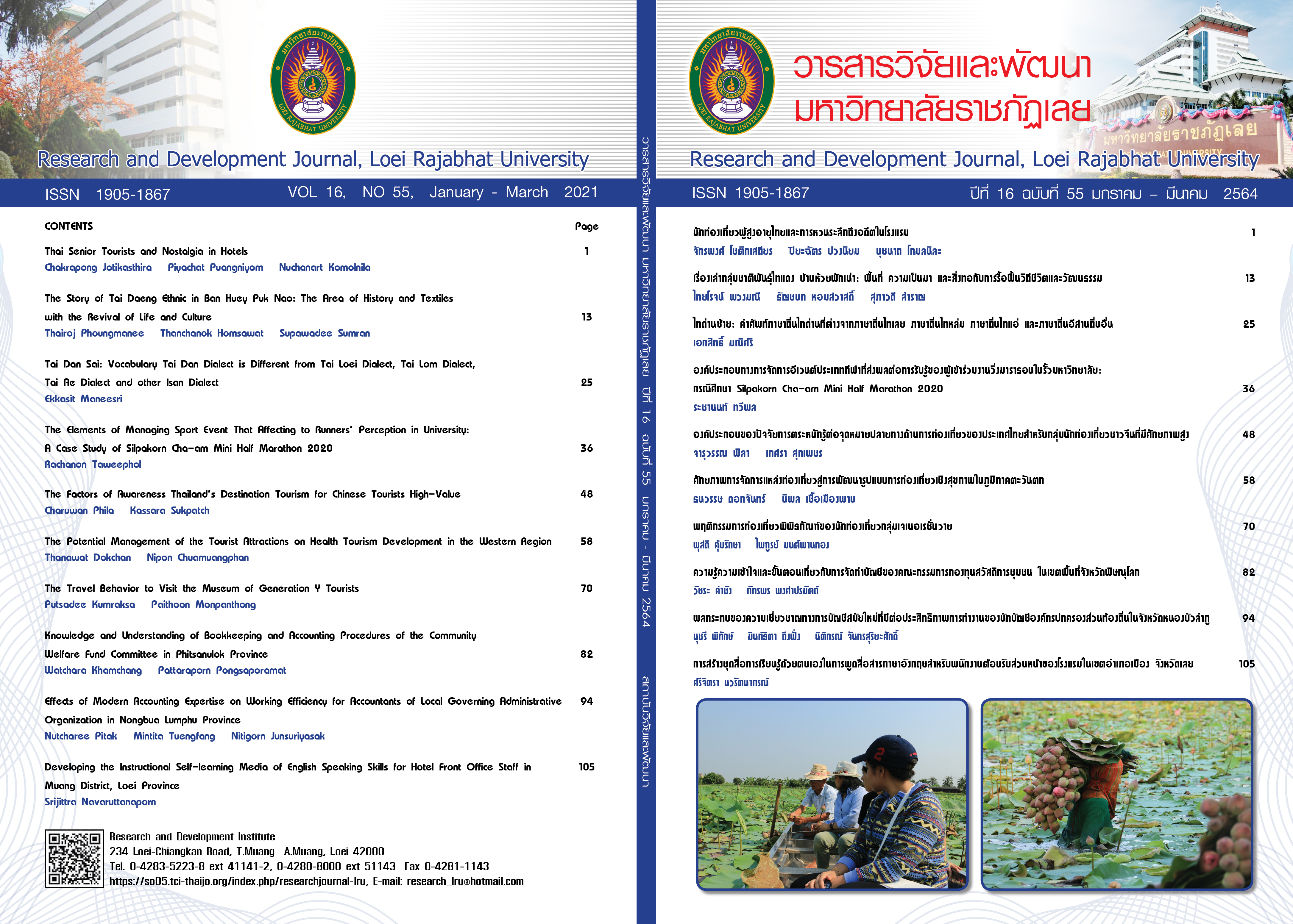Thai Senior Tourists and Nostalgia in Hotels
Keywords:
hotel, elderly tourists, nostalgiaAbstract
This academic article aims to present the idea of applying nostalgia in hotel in order to attract elderly tourists which a number of them has continually increased all over the world. Especially Thailand is one of the countries that will enter a complete transition to aged society in 2020 and it is anticipated that there will be more than 20 percent of population aged 60 years or older in 2021. This is a great opportunity for hoteliers to expand their business in order to reach and respond to the needs of this group of tourists, due to the fact that elderly tourists have the potential to spend more money and will be able to stay for a longer period of time than other group of tourists. It is ideal for the hotel owners to pay more attention in designing their properties in the perspective of appropriateness, convenience and safety. In addition, if the hotel can apply the idea of nostalgia to decorate and create activities that are valuable to bring back old good memories, this will make a great impression on elderly tourists and could be one of the factors that will increase their motivation on returning to the hotel in the future.
References
กรมควบคุมโรค กระทรวงสาธารณสุข. (2563, 2 เมษายน). คำแนะนำสำหรับการดำเนินงานโรงแรม. สืบค้นจาก https://ddc.moph.go.th/viralpneumonia/eng/file/recommendation/03hotel_operations.pdf.
กรวรรณ สังขกร และคณะ. (2558). รายงานวิจัยเรื่อง การบริหารและการจัดการการท่องเที่ยวในภาคเหนือตอนบนเพื่อรองรับนักท่องเที่ยวผู้สูงอายุ (รายงานงานวิจัย). กรุงเทพฯ: สำนักงานคณะกรรมการวิจัยแห่งชาติ (วช.) และสำนักงานกองทุนสนับสนุนการวิจัย (สกว.).
ชาตรี บัวคลี่. (2556). เรโทรสไตล์ดีไซน์บายวันวาน. วารสารวิชาการการสื่อสารมวลชน มหาวิทยาลัยเชียงใหม่, 2(1), 6-7.
ณัฐิญา วงละคร. (2557). การวิเคราะห์แรงจูงใจในการเดินทางของผู้สูงอายุในประเทศไทย (วิทยานิพนธ์ปริญญาวิศวกรรมศาสตรมหาบัณฑิต). มหาวิทยาลัยสุรนารี, นครราชสีมา.
เบญจพร เชื้อผึ้ง และคณะ. (2561). แนวทางการจัดการการบริการของโรงแรมเพื่อรองรับนักท่องเที่ยวผู้สูงอายุชาวไทที่มาพักแรมในจังหวัดพระนครศรีอยุธยา (วิทยานิพนธ์ปริญญาปรัชญาดุษฎีบัณฑิต). มหาวิทยาลัยพะเยา, พะเยา.
ปริญญา นาคปฐม และระชานนท์ ทวีผล. (2561). การพัฒนาคุณภาพงานบริการทางการท่องเที่ยวสำหรับกลุ่มนักท่องเที่ยวผู้สูงอายุ. วารสารบัณฑิตศึกษา มหาวิทยาลัยราชภัฏวไลยอลงกรณ์ในพระบรมราชูปถัมภ์, 12(1), 255-269.
ปฤณพร บุญรังษี และประสพชัย พสุนนท์. (2561). ปัจจัยที่ส่งผลต่อการเลือกใช้บริการโรงแรมของนักท่องเที่ยวชาวไทยในเขตกรุงเทพมหานคร. วารสารวิชาการ มหาวิทยาลัยธนบุรี, 12(29), 193-205.
เพ็ญพักร์ศินา วิเชียรวรรณ. (2559). จิตลักษณะและสถานการณ์ที่เกี่ยวข้องกับพฤติกรรมการท่องเที่ยวเชิงสุขภาพภายในประเทศของผู้สูงอายุ. วารสารครุศาสตร์ปริทรรศน์, 3(2), 13-28.
รักษพล สนิทยา. (2555). ปัจจัยที่มีอิทธิพลต่อภาวะสุขภาพจิตของผู้สูงอายุไทย (วิทยานิพนธ์ปริญญาศิลปศาสตรมหาบัณฑิต). จุฬาลงกรณ์มหาวิทยาลัย, กรุงเทพฯ.
วานิสสา ตโนภาส และกองกูณฑ์ โตชัยวัฒน์. (2554). พื้นที่ใช้สอยและสิ่งอำนวยความสะดวกที่จำเป็นต่อรีสอร์ทสำหรับผู้สูงอายุ (วิทยานิพนธ์ปริญญาวิทยาศาสตรมหาบัณฑิต). มหาวิทยาลัยธรรมศาสตร์, กรุงเทพฯ.
วิไลพร ตรีพรชัยศักดิ์. (2555). แนวทางการปรับปรุงอาคารในการจัดสิ่งอำนวยความสะดวกสำหรับผู้พิการและผู้สูงอายุ กรณีศึกษาโรงแรมในเขตกรุงเทพฯ (วิทยานิพนธ์ปริญญาสถาปัตยกรรมศาสตรมหาบัณฑิต). จุฬาลงกรณ์มหาวิทยาลัย, กรุงเทพฯ.
ศุภมณฑา สุภานันท์. (2557). การสื่อสารอัตลักษณ์และประสบการณ์การท่องเที่ยวของผู้สูงอายุไทย. (วิทยานิพนธ์ปริญญานิเทศศาสตรดุษฎีบัณฑิต). จุฬาลงกรณ์มหาวิทยาลัย, กรุงเทพฯ.
สำนักงานส่งเสริมวิสาหกิจขนาดกลางและขนาดย่อม (สสว.). (2561, 2 มิถุนายน). ธุรกิจโรงแรม ท่องเที่ยว และภัตตาคาร. สืบค้นจาก http://www.sme.go.th/th/download.php?modulekey=224.
สำนักงานส่งเสริมวิสาหกิจขนาดกลางและขนาดย่อม (สสว.). (2562, 5 เมษายน). รายงานสถานการณ์วิสาหกิจขนาดกลางและขนาดย่อม ปี 2562. สืบค้นจากhttp://www.sme.go.th/upload/mod_download/download-20190909110059.pdf.
สำนักงานสถิติแห่งชาติและการท่องเที่ยวแห่งประเทศไทย. (2560). การสำรวจพฤติกรรมการเดินทางท่องเที่ยวของชาวไทย ปี 2560 (ในรอบปี 2559). กรุงเทพฯ: สำนักสถิติพยากรณ์ และสำนักงานสถิติแห่งชาติ
สำนักหอสมุดกลาง มหาวิทยาลัยรามคำแหง. (2554, 11 สิงหาคม). สนเทศน่ารู้ขนมไทย ปี 2554. สืบค้นจาก https://www.lib.ru.ac.th/journal/kanom.html
สิรัชญา วงษ์อาทิตย์ และยุพาวรรณ วรรณวาณิชย์. (2559). ปัจจัยที่มีผลต่อการตัดสินใจท่องเที่ยว เชิงโหยหาอดีตของนักท่องเที่ยวชาวไทย. วารสารวิทยาลัยดุสิตธานี, 10(1), 115-131.
เสาวรัตน์ บุษรานนท์ และสุดารัตน์ สุดสมบูรณ์. (2561). แนวทางการพัฒนาโรงแรมสาหรับนักท่องเที่ยวผู้สูงอายุ. วารสารเทคโนโลยีภาคใต้, 12(2), 229-234.
อัศวิน แสงพิกุล. (2560). ปัจจัยด้านคุณภาพของแหล่งท่องเที่ยวที่มีอิทธิพลต่อการกลับมาเยือนซ้ำของนักท่องเที่ยวในจังหวัดภูเก็ต. วารสารการจัดการสมัยใหม่, 15(2),159-168.
Akçay, S., Kiliç., B., Esen, F. O. N., & Yozukmaz, N. (2017). The factors influencing senior tourists' hotel preferences. Conference proceedings, 7th Advances in Hospitality & Tourism Marketing & Management (AHTMM) Conference, Famagusta, Cyprus, 10-15 July 2017, 346-364.
Alexandris, K., Douka, S., Papadopoulos, P. & Kaltsatou, A. (2008). Testing the role of service quality on the development of brand associations and brand loyalty. Managing Service Quality: An International Journal, 18(3), 239-254.
Aliana Man Wai, L., Shih-Shuo, Y. & Li-Hui, Ch. (2015). Nostalgic tourism in Macau: The bidirectional causal relationship between destination image and experiential value. Journal of Hospitality and Tourism Technology, 6(1), 89-99.
Castellano, S., Ivanova, O., Adnane, M., Safraou, I. & Schiavone, F. (2013). Back to the future: adoption and diffusion of innovation in retro-industries. European Journal of Innovation Management, 16(4), 385-404.
Chih-Chien H., Yu-Ting H. & Shih-Yun H. (2014). Nostalgic emotion, experiential value, brand image, and consumption intentions of customers of nostalgic-themed restaurants. Journal of Business Research, 67(3), 354-360. doi: http://dx.doi.org/10.1016/j.jbusres.2013.01.003
Chih-Chien, H., Yu-Ting, H. & Shih-Yun Hsu. (2015). Nostalgia as travel motivation and its impact on tourists' loyalty. Journal of Business Research, 68(1), 81-86. doi: http://dx.doi.org/10.1016/j.jbusres.2014.05.003
Chun-Fang, Ch., Wen-Yu, Ch. & Chia-Yuan, H. (2019). Classifying technological innovation attributes for hotels: an application of the Kano model. Journal of Travel & Tourism Marketing, 36(7), 796-807.
Duncan, O. (2014). Introduction to structural equation models. Elsevier.
Megan Cleaver Sellick. (2008). Discovery, Connection, Nostalgia. Journal of Travel & Tourism Marketing, 17(1), 55-71.
Solomon, M. R., Polegato, R. & Zaichkowsky, J. L. (2011). Consumer behavior: Buying, having, and being. Toronto: Pearson Prentice Hall.
Sultan, A. J., Muehling, D., & Sprott, D. E. (2010, July). The effect of personal attachment and usage on consumers’ response to nostalgia. In Allied Academies International Conference. Academy of Marketing Studies. Proceedings, 15(2), 1.
Toledo, Ana Carolina., & Lopes, Evandro Luiz. (2016). Effect of Nostalgia on Customer Loyalty to Brand Post-Merger/Acquisition. BAR-Brazilian Administration Review, 13(1), 33-55. https://dx.doi.org/10.1590/1807-7692bar2016150007
Vignolles, A., & Pichon, P. (2014). A taste of nostalgia. Qualitative Market Research, 17(3), 225. Retrieved from https://search.proquest.com/docview/1661348959?accountid=48250.
Downloads
Published
How to Cite
Issue
Section
License
ข้อความที่ปรากฎในวารสารฉบับนี้เป็นความคิดเห็นของผู้เขียนแต่ละท่าน สถาบันวิจัยและพัฒนา มหาวิทยาลัยราชภัฏเลย และกองบรรณาธิการ ไม่จำเป็นต้องเห็นด้วยและไม่มีส่วนรับผิดชอบใดๆ
สถาบันวิจัยและพัฒนา มหาวิทยาลัยราชภัฏเลย ขอให้ผู้อ่านอ้างอิงในกรณีที่ท่านคัดลอกเนื้อหาบทความในวารสารฉบับนี้






